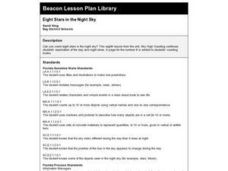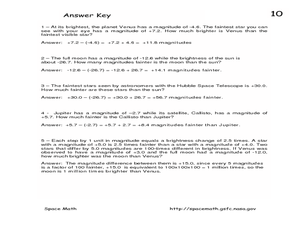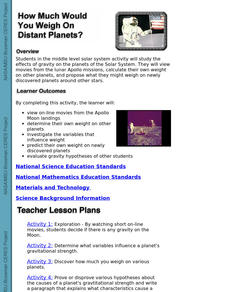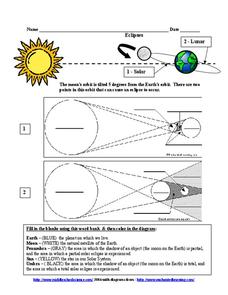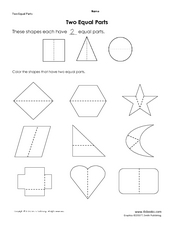Curated OER
Eight Stars in the Night Sky
First graders explore the day and night sky. They complete a number 8 page for their counting books.
Curated OER
Reach for the Stars
Students consider the significance of space exploration. In this space science lesson, students visit selected websites to discover information about astronomy, lunar missions, and space travel. Students discuss the value of space...
Curated OER
The Earth, Sun Mood and Stars Unit (Planets too!)
Fifth graders prepare five activities to do then show their energy saving skills. In this investigative lesson students create five projects then participate in an energy saving demonstration.
ESL Kid Stuff
Our World
There's a beautiful world all around us! Learn about the features of our planet with a series of activities designed for English learners. Kids sing, dance, and read about nature with fun lessons and interactive play.
It's About Time
Communication Through Space
If humans do find aliens, how would we communicate with them? An intriguing lesson walks through some of the challenges associated with this question. How long would a message take to reach a specific destination, what language should we...
American Museum of Natural History
Meet the Universe's Main Attraction ... Gravity
Learners read a short description about gravity and what it does and then explore the two ideas about how gravity works. After gaining a better understanding of the concept, individuals participate in a thorough experiment on what would...
media.yurisnight.net
Science Lesson Plan: Our Solar System: I Wonder?
Ever wonder why Pluto isn't considered a planet? Or how large the Earth is compared to the other inner planets? Explore the universe with a series of projects that simulate different aspects of our solar system. The activities require...
Curated OER
Space Words and Comparatives
Which is bigger: the sun or the moon? Which is nearer: the planets or a star? English Language Learners first located a series of space-related nouns and adjectives in a word search, and then identify the comparative and superlative...
Curated OER
Small Angle Calculations
Students work with circles, angles and estimating angles in the night sky. In this circles and angles lesson, students practice measuring a degree using the circumference of a circle and apply the degree to determine a way to use their...
Curated OER
The Undiscovered Planet
Students find a planetary object using star fields. In this investigative instructional activity students determine the distance to an object using trigonometric parallax.
Curated OER
The Stellar Magnitude Scale
In this stellar magnitude scale instructional activity, students use a scale showing the magnitude of objects in the sky to answer 5 questions about the brightness of the moon, the planets and stars.
Curated OER
The Sky Jeopardy
First graders reinforce concepts about sun, moon, day, night and sky by playing the Sky Jeopardy game. In the end, 1st graders get to nibble crackers in order to show the different phases of the moon.
Curated OER
How Much Would You Weigh On Distant Planets?
Learners study the effects of gravity on the planets of the Solar System. They view movies from the lunar Apollo missions, calculate their own weight on other planets, and propose what they might weigh on newly discovered planets around...
Curated OER
Sky Watchers: Ancient Astronomers
Middle schoolers close their eyes and picture the sky. They are asked to brainstorm things they may see in the course of a night and day, such as the movement of the sun, moon, and stars. Students work in groups to coduct their...
Curated OER
Time Intervals
In this time intervals worksheet, students solve 8 problems where they determine the time gamma-ray bursts last, the time black hole micro-flares are emitted, the time coronal mass ejections travel and the days between lunar phases of...
Curated OER
Yesterday, Today and Tomorrow--Measurements of Time
In this measurement of time learning exercise, students read a short article and then look at 12 pictures and draw a line from each one to either the sun or the moon. Students distinguish whether each picture is happening in the day or...
Curated OER
Stamps are Making News
Students analyze the cost of mailing a letter since 1917, then read a news article about the increasing stamp price and new Star Wars stamps that will be available. For this current events lesson, the teacher introduces the article with...
Curated OER
Solar System
For this space worksheet, students identify and locate vocabulary terms and names related to the Solar System. There are 23 words located in the puzzle.
Space Awareness
Meet Our Neighbors: Sun
The sun isn't just a ball of yellow! Young scientists learn about the features of the sun using a hands-on modeling activity. They build models of the sun using common household items to represent sunspots, solar prominence, and the...
Curated OER
Eclipses
In this eclipses instructional activity, students are given diagrams of a solar and lunar eclipse. They fill in each diagram with given terms and color the diagram to indicate the process for each type of eclipse.
Curated OER
Celestial Characters
Students read myths and legends about celestial bodies, compare cultural perceptions of celestial personalities, represent "character" of sun, moon, clouds, or stars, and invent their own stories about their chosen celestial characters.
Curated OER
Rhyming Picture Cards
For this sounds worksheet, students match six pictures by grouping the rhyming ones together. Rhymes include moon/balloon/spoon and car/jar/star.
T. Smith Publishing
Beginning Fractions Equal Parts
After looking at four examples of shapes divided into two exactly equal parts, junior geometers try their hand. One valuable thing about this worksheet is that the shapes are not only the standard circle, square, and triangle, but also...
Curated OER
The Solar Cycle
Learners research the solar cycle. In this Science lesson, students use the internet to investigate the solar cycle. Learners produce a spreadsheet and graph from the information collected.


